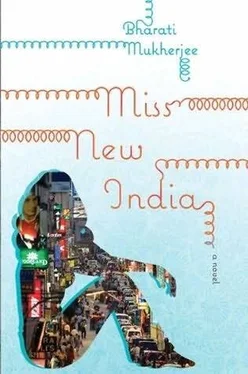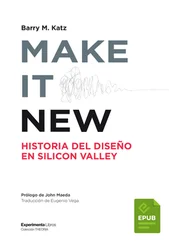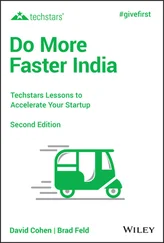"My heroes!" she sighed, a line she remembered from Seinfeld, when the first of the crocs came out. The fish was half the croc's size and it raised itself on its hind legs to get full extension, the full effect of gravity to help slide the fish down its gullet-a great subject for a photograph.
The boys wished something larger would come out of the water, something canoe-long and twice as wide, but what bait would suffice, except maybe Anjali, tied to a stake? She was agreeable; can't cook, doesn't sew, won't row. Bait's good. "A girl's got to pull her weight," she said.
Rabi suggested, "We could let her twist in the sun for a while, and then when we spot the really big one, we deftly remove the rope…"
"…and hope we can reel her back to the boat in time," said Moni.
"It's a plan," said Anjali.
The Deputy Assistant Manager's Assistant ("Sounds like a name from Catch-22 " said Moni; Anjali drew a blank but kept smiling) swore there were some big fellows in the river, but usually not on the islands. They sunned themselves on the banks but they favored the slower, warmer waters downstream, where the bigger fishes and otters swam. They'll go for birds too. And sometimes the bats-some trees harbor thousands of bats in the afternoon, and some of the younger ones get pushed off their perches and fall in the water. Sometimes they don't even hit the water before a big croc snaps them up.
That would be a picture. "Make it so, Number One," said Rabi.
In the manager's bungalow there were photos from the old British days, showing crocs attacking tigers. Rabi called it, with an eye to Anjali, "Big-time debt recovery. These guys didn't mess around." Tigers and chitals, crocs and boars. No tigers now, maybe some leopards, but no competition with the crocs. Crocs are at the top of the food chain, except maybe below bats. In gross tonnage per annum, one little bat probably out-eats a croc. Nothing tops a bat.
"Who knew?" said Anjali.
Rabi started to reminisce. "When I was a little boy back in San Francisco, I'd spend weekends with my father. We'd go for long walks on Ocean Beach, or sometimes down past Candlestick. The old Italians would be sitting there in folding chairs with five or six poles stuck in the sand, sipping a beer or maybe their homemade wine, eyes half closed, waiting for the bell at the tip of their pole to tinkle. They'd give it a jerk. Like clicking a shutter release. It was magic."
"I know," said Moni. "My parents had a summer place in British Columbia. I used to jig for rock cod on Galiano Island. I'd stretch out on the dock and wrap the line around two fingers and just lower it into the rocks. If I didn't get a fish, I'd get a crab or a lobster. You stare long enough into dancing water and you think you're in there with the fish, like you've sprouted gills."
Rabi's ego was so vast, it encompassed the world. Anjali felt herself a part of it.
"Watch out for Moni," said Rabi. "He'll Photoshop a pair of nesting pterodactyls."
It's a Photoshop world, she thought.
"We've all been Photoshopped," said Moni. "I know I've been."
She had no memories. Her memories were only starting now. Her life was starting now.
The boys drank beer; she had a soda. Three small crocs were exploring the tripods; like kittens or puppies they were trying to climb them and bite the cameras. Rabi kept clicking away.
"Um, Rabi, old man," Moni whispered. "Turn around very, very slowly."
Not five feet off the bow, two eyes and a pair of nostrils floated, unattached, it seemed, to anything underwater. Except that far away downstream the water eddied at the base of an armored tail. And to think, just seconds before, Anjali had been swirling her hands in the water to clean them of fish slime.
Click!.
The rest of the day was devoted to birds and bats. Overripe fruit, halved watermelons, spotted mangoes, and guavas were spread at the base of a rookery tree, the tripods set, cameras loaded and guano hoods attached, remotes set. A few flying fox bats dropped down from the trees despite the daylight hour. It was never too bright in the forest. They moved over the moldering fruits like stooped old men in heavy capes. They reminded Anjali of the priests at Vasco da Gama, with their long coats and bent posture. "The weight of the world," Father Thomas used to say. But in the zoom lens their true nature appeared, and their name held true: foxes. Sharp-faced, intelligent dogs, with wings.
Then the three paddled upriver and drifted back down, Anjali consulting the bird guide, pointing "There, there," and Moni and Rabi taking turns paddling and taking pictures till the light began to fail and the foxes lifted off from their trees for a night of pillaging.
THEY SAT IN three slack, ground-grazing sling chairs, just a small step up from hammocks, swirling dal and chapatis with their fingers, sipping beer, looking out over the water. In their sun hats and full sleeves against the mosquitoes, they could have been nineteenth-century British planters surveying God's handiwork, with full satisfaction. My boys, Anjali thought. My brave, funny boys.
In the last minutes of sunlight, the smooth river was pocked by leaping fish, swooping birds, and drifting logs-floating eyes and nostrils-that weren't logs at all. The clear, peach-colored sky was sooty with funnels of bats lifting off from the trees.
She had a sudden thought: Nothing bad can come of this.
I'm down to one iron in the fire. Debt-recovery agent. If anything is to come of this night, or the future, she thought before turning in, I owe it to bats and crocodiles. How to explain the wonders of this world?
It was a winter's day when the air was cool and the sunlight was wan and the mosquitoes were out in their post-monsoon exuberance. We were told to expect a visit by a da Gama alumna who had left Gauripur, found a job, and succeeded in ways our teachers always told us we could too. Her name was Anjali Bose, and many of us remembered her as a tall, outgoing girl, one of the Bengalis in the Hindi-speaking heartland of Bihar. She'd gone to fabled Bangalore and worked hard and found a modest position, then risen within it. Our teacher knew her well. He said she had "the spark," and thanks to her and millions like her, India was on fire. Even Gauripur was on fire. He was our fomenter of hope. She didn't bring the fire all by herself, but she was a "collateral beneficiary."
He said she was just one in a billion, but each of us had it in us to be another one in a billion. He said she, and a friend, would come to his corporate management class and give a little talk. If we were ready to listen, and to act, she had lessons to teach us.
What to say about Gauripur since she left? Maybe she'll notice a crane on the horizon, more women and children carrying bowls of cement on their heads, some painters' scaffolding around old buildings, and new apartment blocks being erected. Pinky Mahal's shored-up walls have been repainted sunflower yellow (although we still call it Pinky Mahal), and the flat roof now supports an atrium with a sky-top restaurant, and all five floors are serviced by elevators and even an escalator. Somehow the air conditioning is working, and shops that were dark for months are now well lit and full of shoppers. Alps Palace Coffee and Ice Cream Shop has relocated to the ground floor of Pinky Mahal, installed a dance floor, and hired an emcee.
The biggest change, potentially, concerns the future of Vasco da Gama High School and College. Gauripur is suddenly one of the "it" towns in the Ganges belt, meaning a future IT magnet, as the older, larger centers mature and become too expensive. A mofussil town like Gauripur has been identified as an emerging small city, with cheap land and housing and a cozy population of just under ten lakhs-a million souls about to be launched into space. And so the church authorities are in negotiation with Infosys and others to create a satellite IT campus. Our mayor tells us we are the beneficiaries of the overspill; we're to be the next high-tech mega center. On new maps, we are represented by a star on the riverbank, halfway between Delhi and Kolkata. But the church is also trying to preserve the "educational mission" of the campus and pressuring Delhi to locate a new Indian Institute of Technology or perhaps an Indian Institute of Management, using the existing structures. One way or another, Gauripur will survive another century. The era of South Indian and Goan pedants reciting their lectures is over. "Materialism is outpacing spirituality," the rector told a local reporter. "It is a global phenomenon."
Читать дальше












